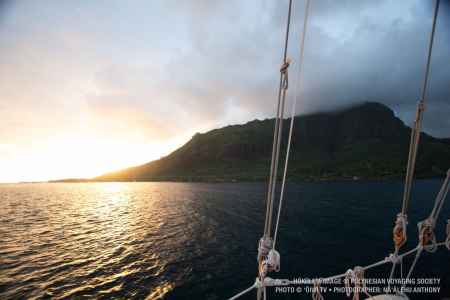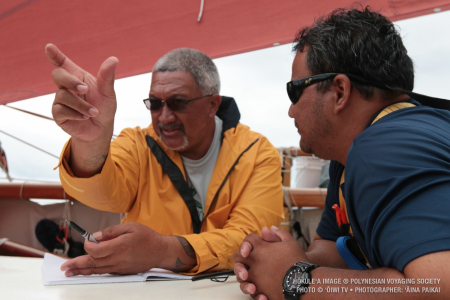Blog | Heidi Guth: Refreshing the Soul
- Posted on 18 Jul 2014
- In Crew Blogs, Featured
Time at sea not only refreshes the soul and recalibrates the spirit, but it also teaches PVS staff first-hand the true needs of the crew and canoe.
The next morning, we awoke for our 6 am – 12 pm watch, with clear blue skies overhead and whales spouting and breaching nearby. Huahine was directly in front of us, as planned. We had learned another good lesson from Hōkūleʻa.
Sometimes, in our land jobs and lives, we push to meet deadlines, lose track of how we get to our destinations, and neglect the opportunities to re-evaluate our course directions and methods. Hōkūleʻa and Hikianalia were supposed to arrive in Huahine earlier this week to meet schedules made by that island’s communities over the past year, but a storm system kept us in Moʻorea.
We were supposed to be in Raiatea Monday morning (July 14, 2014), but the waʻa can only sail based on existing weather conditions. We have to deal with the conditions at hand, and make the best decisions based on them, while still respecting the efforts and care of the communities we visit. We tacked off of Huahine and arrived in Raiatea on Monday afternoon. The leaders of the navigational piko of Taputapuatea, Raiatea, efficiently spread the ceremonies over two days, and our gracious community liaisons rescheduled our visits with Huahine. Our hosts honored the adjustments to our voyage based on navigational and voyaging needs and values, just as we humbly honored the needs and desires of our host islands.
After years of working in an office for the crews and canoes of the Polynesian Voyaging Society, several staff members have trained as, and are privileged to be, crew on the canoes during various legs of the Mālama Honua voyage. Trading air conditioning and fluorescent lighting for sea breezes and an open skylight, the change in perspective is invaluable, personally and professionally.
In the PVS office, we keep the non-profit running, manage grants and contracts, and maintain constant educational and community outreach. Our first priority, however, remains the waʻa and kanaka at sea – their needs must be met first. It’s at least a 12-hour-a-day, 7-day-a-week, always-on-call job, much like my current 6-12 watch, morning and night, on the waʻa.
For example, logistically, each island nation has its own customs regulations, agricultural protections, cultural protocols, health concerns, communication limitations, timing requests and local requirements. PVS volunteers and staff research these components at home in Hawaiʻi, and send liaisons ahead of the waʻa when practical to scope anchorages and ask questions of locals. No one wants to put canoes or crew in harm’s way, or overtax captains and crew with burdensome tasks beyond taking care of themselves and the waʻa, which is a fulltime job at sea. Nonetheless, life at sea requires constant flexibility, and crew on the waʻa need the capacity to meet the logistical changes that are intrinsic to sailing. They cannot just rely on paperwork from the office. For example, the waʻa may need to arrive or depart nations from different ports than anticipated, and previously unknown cultural protocol may dictate that crew acquire specific attire.

A crewmember on the original 1976 from Hawaiʻi to Tahiti, Billy Richards gazes into the horizon onboard Hōkūleʻa.
Our responsibilities to the waʻa and each other do not end when we are anchored or moored in port. They are multiplied by our duties to our host communities (participating in ceremonies, learning the priorities they wish us to carry around the world for them, and maintaining our connections of culture, ancestors and reverence for shared oceans and homelands). Often these additional duties are unknown until arrival. Shore duty also includes constant trouble-shooting of the impacts of voyaging on sails, wood, rigging and our new electronics that link us to our worldwide community. Our watches are retained while in port, with anchor watches at night to assure that our two waʻa stay in place and that steady maintenance continues. We are always on duty, always learning, and always appreciative.
Voyaging as a crewmember brings the office work to life and provides an opportunity to improve our voyage at home and at sea. The more that captains and crew can focus on their waʻa and ports of call, the clearer their observations become, the better decisions they can make, and the more beneficial the lessons they can absorb and share with all of us.
Iaorana from offshore Huahine – again – this time as we prepare for arrival. We are cleaning the waʻa and readying our uniforms, and my watch is on deck. It’s my turn on the sweep. Mauruuru roa to my colleagues for their support, which allows me to continue to learn from our canoes, crew, ocean and Pacific family.












